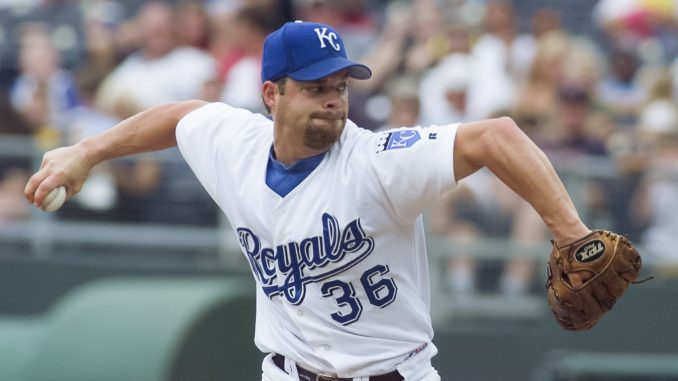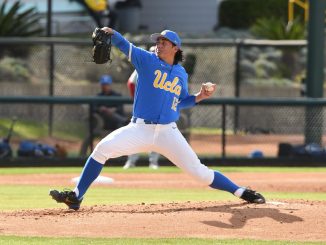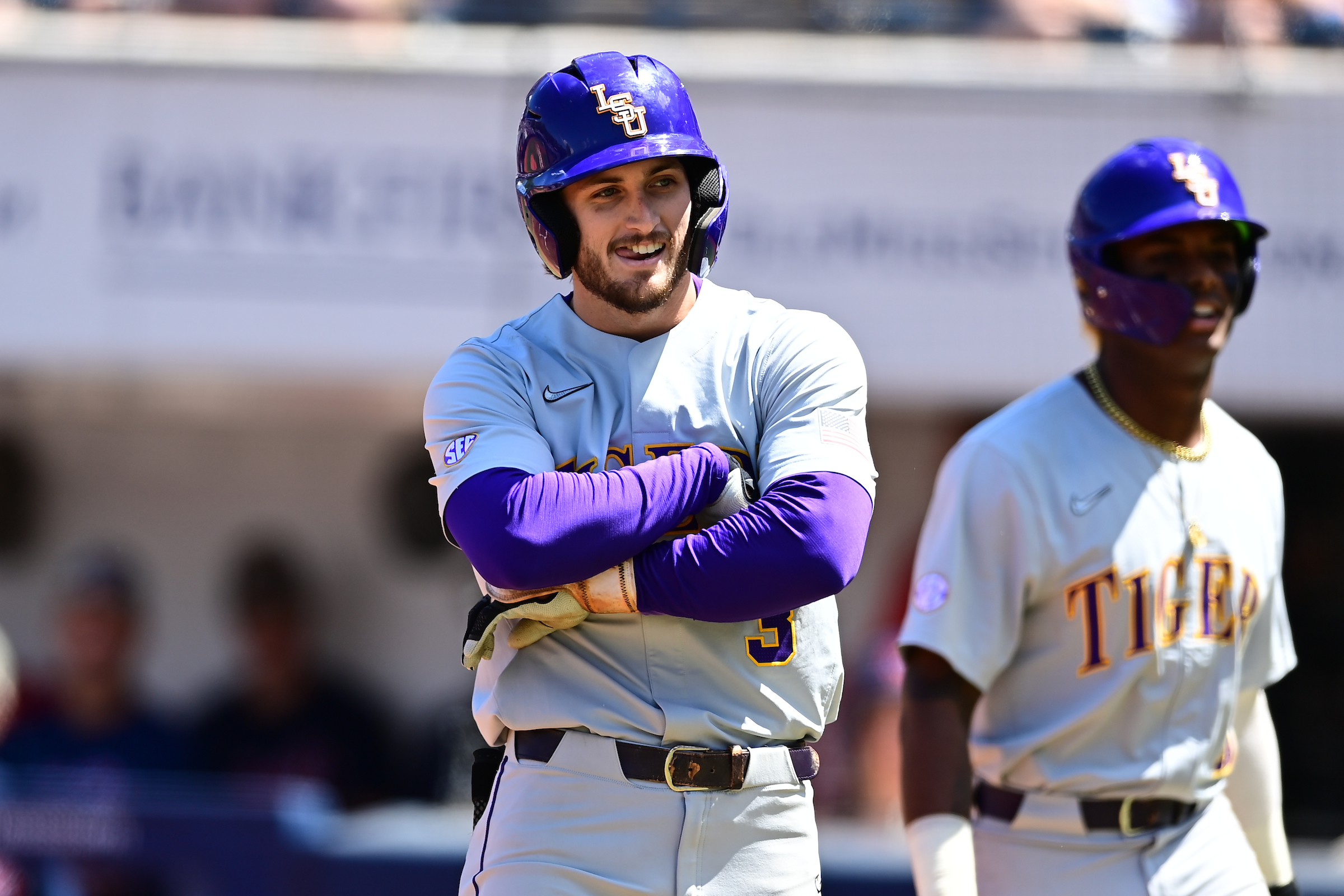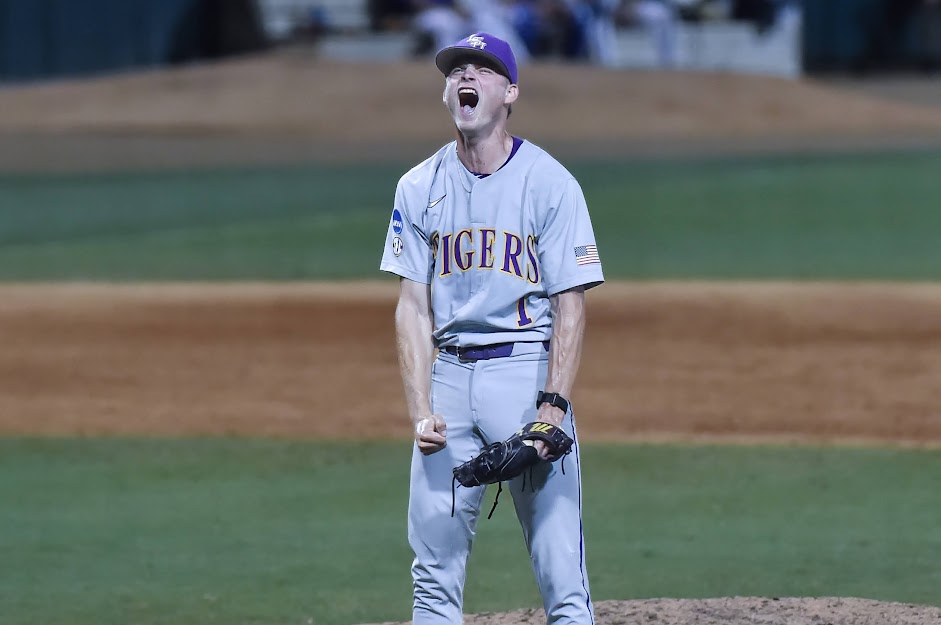
(Editor’s Note: This is the third in a series of former athletes or coaches with ties to LSU that will be inducted into the Louisiana Sports Hall of Fame in Natchitoches on July 29. Today: Paul Byrd).
By JOE MACALUSO, Written for the LSWA
It’s late summer 1988, and the latest crop of freshmen were stepping onto the LSU campus.
A handful among them had elected to spend most of their next few years inside Alex Box Stadium.
Among them was a tallish, thin, blond-headed, wide-eyed kid from Kentucky, a youngster who, when he wore black-rimmed glasses, looked more like he was destined to become a professor than most anything else, and certainly not a record-setting pitcher on a record-setting team.
Paul Byrd, 6-foot-1, 170 pounds, of Louisville, Kentucky’s St. Xavier High School, throws right handed.
That was the most anybody knew, except soon-to-be-legendary LSU coach Skip Bertman knew more, something his teammates found out long before Byrd’s first pitch in the 1989 season.
Paul Byrd was intelligent, more cerebral than most baseball players – and talented.
“He was super smart,” Bertman said. “He had a good fastball, and a wonderful breaking ball, not one I taught him, a breaking ball he brought with him. Paul was one of the best competitors we’ve ever put on the mound.”
That was borne out in his days at LSU and over 14 years pitching in Major League Baseball, a career that has landed him in the Class of 2023 of the Louisiana Sports Hall of Fame. The 2023 Induction Celebration is July 27-29 in Natchitoches, with information and tickets available at LaSportsHall.com or by calling 318-238-4255.
Oh, another thing his fellow Tigers discovered – Paul Byrd was a perfect fit for the Dr. Jeckyl-Mr. Hyde sequel.
For Mike Bianco, then Gary Hymel, the LSU catchers who watched Byrd grow steadily into a pitcher who would spend 14 seasons in the major leagues, Byrd’s competitiveness was pure baseball.
Bianco first: “Paul had a great personality off the field, but was different when he crossed that line.
“All the great ones have that. Paul certainly had that – a ‘winner’ mentality. Once he crossed that line, you knew the game was Paul Byrd’s game to be had.”
It was needed in 1989 when LSU established itself as a rising college baseball power. The stunning doubleheader sweep at No. 1 Texas A&M’s regional sent the Tigers to the College World Series for the third time in four seasons.
Not too many years later, that ’89 pitching staff would be regarded as an all-time great – Golden Spikes Award winner Ben McDonald, Russell Springer, Curtis Leskanic, Byrd and his fellow freshman Chad Ogea would spend multiple seasons in the big leagues.
But, that rookie season turned out to be bittersweet. Being named Freshman of the Year on the All-Louisiana College Baseball Team and on Collegiate Baseball’s Freshman All-America team didn’t lessen the Byrd’s pain of those CWS losses.
Springer came into the 1989 season off shoulder surgery and couldn’t work into the regular rotation.
Byrd ate up those innings – 10 starts among 21 appearances – and established a pattern for what would be a record-setting 1990 season — one, Bertman said, was one of the most significant in LSU baseball history.
Bianco was gone and Hymel took over behind the plate. Anyone who knows baseball, understands there must be a special bond between pitcher and catcher.
Hymel understood. All players heard Bertman’s mantra about life, about how it’s not always easy, that baseball mirrors life – hard and easy days, cloudy and sunshiny days – situations Bertman passed along to his teams.
And Byrd was having one of those “cloudy days,” a game that produced one of the most repeated stories in LSU baseball lore.
Hymel had a front-row seat: “Paul was struggling, I don’t remember what game, and that brought Skip from the dugout.
“Now Paul’s the nicest guy ever and he says, ‘I’m sorry coach, I’m trying to figure this out,’ and Skip says, ‘Byrd, it’s not your fault. It’s all my fault. I never should’ve recruited you.’ Well, Paul’s eyes got real big, and that was it.”
Byrd’s best Bertman imitation comes when he recalls that mound meeting. He still laughs.
“And,” Bertman said, “Paul was more than talented. He was funny and could imitate me very well. The players loved him for that, nothing bad, nothing mean, just fun to be around. Everybody loved him.”
That one minute on that mound that day only proved to Byrd how much Bertman tried to get the best from his players.
“Coach Bertman was such a good motivator. I was going to Arizona State, but in 10 minutes with him talking to me, I decided on LSU,” Byrd said. “I was just going for a visit (to LSU), but he told me LSU couldn’t win without me. I was the only recruit in that weekend and it was special.
“Coach Bertman asked me what number I’d like to have before I took the trip and I told him No. 22. That was (assistant coach) Smoke Laval’s number so I knew I didn’t have a chance, but when I walked into the locker room, there was a No. 22 jersey with my name. That was special, and I committed that day.”
That “special” feeling lingered, and Byrd’s versatility was needed even more in 1990. Injuries forced Bertman to make a hard decision about his sophomore righthander.
By then, Byrd was a fixture in the SEC’s All-Academic team. “Bookworm” became his nickname. It should have been “Bookend.”
As foreign as it is in today’s game, Byrd was asked to be a starter and reliever in 1990, a season when he went 17-6, and earned an invitation to the USA Training Camp.
Bianco understood that record’s significance, especially now that he’s a long-tenured, College World Series-winning head coach at Ole Miss.
“When Paul won 17 games, he answered all the questions,” Bianco said. “Winning 17 games in college baseball season is unheard of, and it’s a record never to be broken.
“Paul had several relief appearances as well as starts, and kids just don’t do that nowadays. That was the beginning of the legend of what became Paul Byrd.”
While his 19 starts that season topped the team, it was the 10 relief appearances that verified Bianco’s “legend” statement. In nearly 28 relief innings, Byrd gave up 19 hits (all singles), allowed 1 earned run with 34 strikeouts and 9 walks.
There was more, like those legendary, two one-run duels with Southern Cal in the 1990 NCAA Regional at Alex Box Stadium, wins that launched a second-straight trip to Omaha and the CWS.
And, another disappointment.
“Paul was in the group of freshmen and sophomores in two World Series. We were on the rise,” said Hymel. “We always wanted to be the group who finished the deed and won the World Series. And, we did.”
With Byrd’s help: his 4-3 win over Oklahoma got LSU to the NCAA South Region finals, and his start in a 19-8 win over Florida shot his team into the winner-take-all, one-game showdown in what turned out to be a 6-3 victory over Wichita State that gave LSU its first national baseball championship.
So, for a kid who was a Babe Ruth World Series MVP; pitched and played two other positions in high school; was the 1987 U.S. Baseball Federation Amateur Junior Player of the Year; an All-Academic SEC star; had a 1-0 record for Team USA and a spot on the 1990 Bronze Medal Goodwill Games team; and College World Series champion, it was time to turn the page.
In his wake was a 31-7 record, 7 complete games, 2 saves and 2 shutouts in LSU’s three-seasons’ 164-54 record.
Passing up a 13th-round draft pick after high school, he was Cleveland’s fourth-round selection in the 1991 Major League draft.
He spent the next few years in the minor leagues, then was traded to the New York Mets for his first Major League start in July 1995.
That game spurred Byrd into a 14-year big-league career, one that ended Oct. 3, 2009 with a three-inning, 3-hit performance for Cleveland just days shy of his 39th birthday. By then, he had been named to the 1999 National League All-Star team, had led the American League in complete games (2002) and was that league’s shutouts leader in 2007.
He had survived a scare with shoulder and arm injuries in 2000 and 2003, and had pitched for 19 different teams in the majors and minors.
“I watched him reinvent himself,” McDonald said. “He struggled at times like a lot of other guys did, but he came up with a different wind-up, an old-school delivery with a lot of deception.
“That takes a lot of talent to change what you know about the game and how to pitch, lots of talent,” McDonald continued. “When you look back on Paul’s career, 109 wins is a lot, and when the average big leaguer plays three years, his 14 years means Paul had a great career.”
Paul Byrd was more.
His baseball-playing peers voted him the “Nicest Guy in Baseball” and baseball writers honored him with the “Steve Olin Tim Crews Good Guy” Award, all a carryover from what his former LSU teammates knew about him.
Much more: Byrd won three Emmys (his latest coming earlier this year with Bally Sports) for his on-air Fox Sports work as a broadcaster, and added a 2021 Emmy for being the “Most Outstanding On Air Personality.”
And, more: his book “Free Byrd: The Power of a Liberated Life,” made him a best-selling author, and went hand-in-hand with founding Byrdhouse Ministries.
Byrd’s devotion to family became evident earlier this year when he decided to take the year off from broadcasting Atlanta Braves games: his wife, Kym, was fighting for her life.
His statement to Braves fans: “…thanks for all the love and questions as to why I won’t be back this year. Almost lost my wife Kym to a medical issue this offseason. So grateful to say that she is on the road to recovery and getting better each day.”
While he and his wife haven’t strayed far from his Georgia home in the last months, Kym Byrd said she is ready to make the trip to Natchitoches for the induction ceremonies.
“I was blown away when Ronnie Rantz called me to tell me I was voted into the Louisiana Sports Hall of Fame,” Byrd said.
Rantz is the Hall of Fame Foundation’s CEO/president and Byrd’s former LSU roommate.
“I mean how special is that for him to make the call?
“Today, and just because Coach Bertman wanted me at LSU, it lives with me now. I found my faith at LSU, walked away with a girl from New Orleans and fundamentally changed my life with our two sons and Kym, and made lifelong friends.
“I love those guys, love the people at LSU. We care about each other, and I have brothers who’ll be close forever,” Byrd said. “Kym and I are deeply touched, and it shows the magnitude of what the Louisiana Sports Hall of Fame means to me and my family.”




Be the first to comment